So, everybody’s favorite cloning scientist Hwang Woo-suk is apparently going to help some Russian scientists clone a Woolly Mammoth. Sweet. That’s just brilliant on so many levels.
Page 27 of 90
I can’t say I’m very surprised by the latest reports of trouble at Billboard magazine. Louis Hau (a big Korea booster who in fact preceded me in Korea with Billboard and several publications, although we never met) is out, along with publisher Lisa Howard and several top editors. Billboard Pro, the DIY-indie sub site, has been closed. Although for me, the most surprising thing is probably that the industry anachronism journal has lasted this long without the brutal bloodletting that The Hollywood Reporter has suffered (sure, Billboard suffered, just not as badly). I always liked my editors at THR, at least on the international side of things, even if the magazine was an out-of-date business model. But at Billboard … well, not so much.

The cronyism with the industry that the Billboard editors were supposed to be covering was much deeper and more endemic. It felt like they were constantly trying to turn the clock back to 1998, before that nasty Internet came along and ruined everything.
If there is a major takeaway I hope people have to my writing in general (and today’s story in the International Herald Tribune), it is that the Internet and globalizations have fundamentally changed the power relationship between artists (or “producers”), fans (or “consumers”), and the music industry (“who knows?”). Gatekeeping isn’t what it used to be.
Oh, a bonus chart from Digital Music News about singles sales, just for fun:

This .gif animation mapping changes in music sales over the past 30 years is pretty cool, too.
I just had a new story about K-pop — “Bringing K-Pop to the West” — appear in the International Herald Tribune (first page of the business section) and New York Times (last page of the biz section, or so I’ve been told). It is kind of interesting to be running in the business section, instead of my usual Arts & Culture, and interesting to co-write a story with someone. I mean, having written for Billboard and other trade magazines for so long, I am quite familiar with culture business writing; but getting into the IHT‘s business pages felt a bit different. Anyhow, I’m happy with how the story turned out and the feedback it has been getting.

There have been a lot of stories appearing in the Western media asking “What is K-pop?”, but for this story I more wanted to ask “Why now?” Artists from all over the world are constantly trying to break into the American and Western market, and usually they don’t have much to show for it. Even Korean pop labels have tried several times.
I also talk a bit more about my thoughts and music in general over at Korean Indie, if you are interested. But there is so much more to address, especially about how the world’s music and culture markets are changing these days. Hopefully I should have some more stories coming soon talking about globalization and other big trends.
Well, I guess my plan to do daily updates for Fantasporto this year did not pan out very well. The festival is not over yet, but I had to return home yesterday. Very sad to be missing the Vampires’ Ball closing party, but I had a really good time again at Fantasporto, seeing a pretty wide range of films and meeting a whole bunch of interesting folks.
One of my favorite films was one of the most mainstream, The Holding — the story of a dysfunctional, all-female farming family, facing all sorts of challenges, when a mysterious stranger shows up one day. Vincent Regan, who plays the stranger, is really good.
The Spanish supernatural comedy Game of Werewolves was quite amusing. I’m quite surprised that it has not really been distributed, even in Spain, as it is a pretty mainstream, funny film. The part with the fingers and the sacrifice was especially good.
One film you might have heard about is The Bunny Game, a super-low-budget bit of “torture porn.” It is the story of a drug-addicted prostitute who gets kidnapped and tortured in the back of a truck. Really, that’s it — black-and-white torture while a teeth-rattling industrial-noise soundtrack blasts incessantly. It is about as extreme as cinema gets, but not in a good way. Some people have compared it Serbian Film, but I thought Serbian Film at least had a brain and a point of view (not to mention production values). Bunny Game, though, is more like something Alex would have been forced to watch during his reprogramming in Clockwork Orange.
The HP Lovecraft film, Whisperer in the Darkness, was also really bad. Schlocky and dull, without a hint of wit or creativity. Imagine HP Lovecraft as re-interpreted by Guy Maddin (that is not a compliment).
Most of the other films that I did not like were mostly bad because of budgets and other constraints, so I do not want to bash them. Most at least had the seeds of good ideas, interesting moments, or other redeeming features — perhaps not enough for a full-fledged endorsement, but not terrible either. I’m sure I’m forgetting some other good films, too, but that’s all for now.
If it’s the end of February, I must be in Porto again, for the Fantasporto fantasy film festival. It is always one of my favorite film festivals in one of my favorite cities.

So far, my favorite movie has easily been Juan of the Dead, the Cuban zombie film that has been racking up awards all over the world since making its debut in Toronto last September. So hard to believe that they actually convinced the Cuban government to let them film in Havana, but somehow they did it.
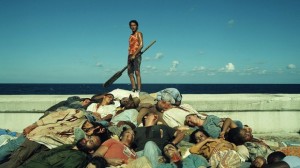
Bellflower is kind of a cross between Breaking the Waves and Fight Club. But I don’t think I mean that in a way that is complimentary to any of those films. It certainly was not terrible. It has a few stylistic moments, a couple of laughs (although perhaps the biggest one was not intentional), but not enough to sustain the meandering story and middling characters.
Bag of Bones, Mick Garris’s TV adaptation of the Stephen King novel, did not start until well after midnight, and old man that I am, I just could not stay awake that late, and gave up about an hour in.
I even checked out one Canadian movie, Eddie the Sleepwalking Cannibal — it’s a Canadian-Denmark co-production and a pretty silly film, but I seemed to be more forgiving of its problems than others I have talked to.
Friday night, I was stumbling home, dead tired (having given up on Bag of Bones around 1:30), when I passed an interesting-looking club called Plano B. It turns out the Catalan soul band The Pepper Pots were playing there … and, this being Portugal, they had not started yet. So I decided to check them out — apparently standing and listening to loud music is much easier to get through than sitting in a darkened theater. The finally went on around 2am and it was a good show. Very much in the vibe of Sharon Jones & the Dap Kings. And, as I said, it was a great venue; some old textile plant that was converted into a cavernous club.

Hopefully, though, there will be more sleep from here on out.
Foreign Policy magazine just put up a great photo series of Iran from before the revolution. Cool and fascinating images of bands, fashion, and a swinging Tehran, once upon a time.
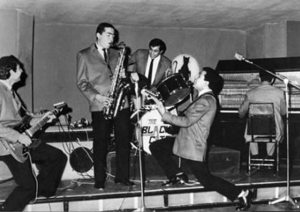
Just like Korea has an amazing music and cultural history from the 1960s and ’70s that too few people know about, so too does Iran and many other countries. It’s a sober reminder that history does not always and only travel in one direction, and often art, culture, and societies get torn apart.
Seeing how Iran gets treated by Western popular culture and news media has long rankled me. Yes, their religious elite are pretty oppressive. But this is a culture with a long and rich history, and even today is full of great poets and filmmakers. Not to mention Conference of the Birds, which is one of the world’s great story collections, up there with the Decameron and 1001 Nights.
Foreign Policy also has old photo collections of Mogadishu, Egypt (not so good), Damascus, Mumbai, and Afghanistan.
A happy day yesterday, as I managed to track down two more Pepe Carvalho novels (in English, of course, as my Spanish reading skills are pretty poor). Pepe Carvalho is one of my favorite detective series, the story of a former-communist and former CIA agent turned private detective working out of Barcelona. Carvalho is also a Galician living in Barcelona, a total foodie (to comical proportions), very smart and even more cynical, making him a good way for author Manuel Vazquez Montalban to mock and critique many aspects of Spanish society and the world.
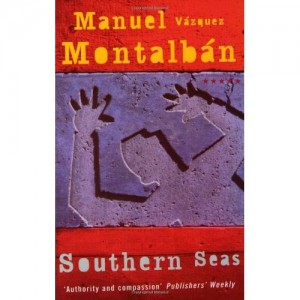
For the past year or so, I find I have been reading a lot of genre fiction. In part, I have been trying to think about what makes a story/series/character popular. I guess my assumption is that often we take a lot of these well-known stories for granted, but there had to have been something there at the beginning, some kernel that excited people and inspired the popularity in the first place. So I have read some Ian Fleming, John LeCarre, Raymond Chandler, and the like. It’s interesting stuff, especially seeing how much slower and lower-stakes the conflicts could be just a generation ago. Other times, you can see some good writing going on, even among writers who perhaps grew more hack-like as time went on.
Anyhow, in the process, I have stumbled across the Carvalho series. The first one I read is still my favorite, Southern Seas, in part because it is set in the late Seventies and has a lot of twisted politics in it. I also really liked An Olympic Death, which talks a lot about how Barcelona was changing during the run-up to the 1992 Olympics (even if some of its AIDS-related storyline has ages poorly).
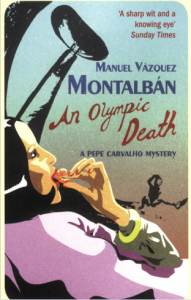
All the Carvalho books provide great looks at a Barcelona that has so totally changed over the past generation … and yet has not changed as much as most people think. Vazquez Montalban has a style that reminds me a bit of Nikos Kazantzakis in its earthiness (although definitely less literary than Kazantzakis), and Carvalho is a bit of a Zorba character.
I also find it interesting the Vazquez Montalban, who was from Barcelona originally, would choose to make his signature character hail from the opposite side of the country. Was there a reason for this? Commentary on Catalan nationalism? The politics of Franco-era Spain (when he began the series)? Unfortunately, I just don’t know enough about the author or the country to say.
The new Carvalho books I picked up yesterday are Murder in the Central Committee and The Angst-Ridden Executive, both early books in the series, from 1977 and 1981 respectively. I’m really looking forward to reading both.
I really like Thomas Whetson’s great website AFRTS Archive, all about the history of the American Forces Radio & Television Service all over the world. However, life gets busy, one gets distracted, and somehow a long time passed without my checking in on his website. Apparently a lot of Korea-related stuff has been posted in the interim.
Here is a post about the first American radio broadcasts in Korea, before AFRTS started. Back then it was called the Far East Network, and started with WVTP in Seoul in 1945 (broadcasting out of the old Bando Hotel), before adding Jeonju and Busan at least by 1947; Jeonju and Busan would close in 1948, and Seoul in 1950. But I loved this scan from Whetson’s site, of the FEN Seoul inaugural broadcast:
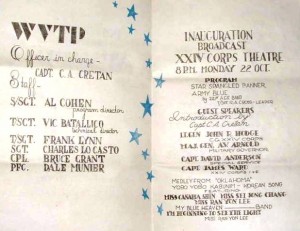
Here are a couple more posts I liked:
– A Camp Casey broadcast in 1977 by Thom, just months after the infamous North Korean axe murder of two US Army officers in the JSA. US forces in the area were moving south to Uijeongbu, but they wanted the local radio station to broadcast as if nothing was out of the ordinary, so Whetson did a show for an empty camp.
– A practical joke at the AFKN that caused a nation-wide freakout that North Korea was doing something very bad.
North Koreans playing Aha’s hit “Take On Me”. Seriously.
Last week was the MadridFusion gastronomic conference in the Spanish capital. I’m sure it was a foodie heaven, and Spain is well known for its experimental and high-end dining these days.
But what I did not know until reading this article is that this year’s guest country was South Korea. It talks about chef Yim GiHo who has a highly regarded restaurant called Sandang — I have never been there, but it looks quite promising. The website is full of food porn, if you are into that sort of thing. I don’t consider myself a super-foodie, but I bet it would have been lots of fun to have attended MadridFusion. Besides, Europeans are pushovers for any type of Asian “fusion.”


